2024年中考英语语法填空有提示词——谓语和非谓语 课件(共23张PPT)
文档属性
| 名称 | 2024年中考英语语法填空有提示词——谓语和非谓语 课件(共23张PPT) |

|
|
| 格式 | pptx | ||
| 文件大小 | 463.8KB | ||
| 资源类型 | 教案 | ||
| 版本资源 | 通用版 | ||
| 科目 | 英语 | ||
| 更新时间 | 2024-02-28 19:59:29 | ||
图片预览

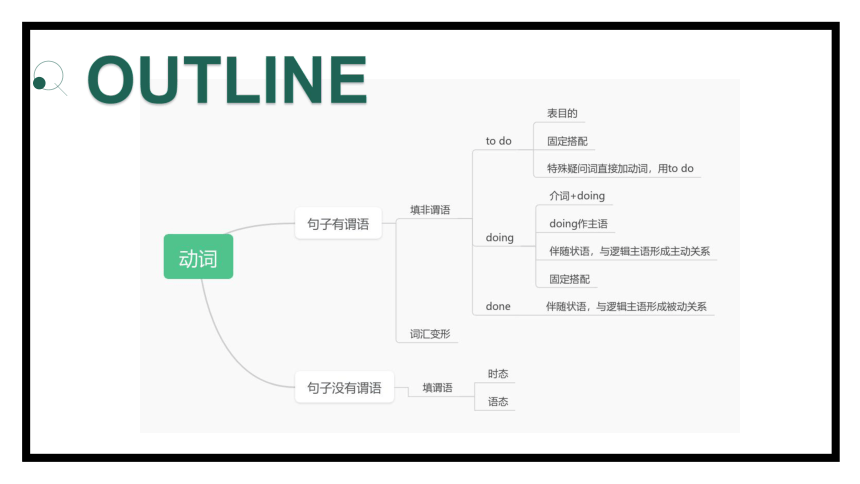
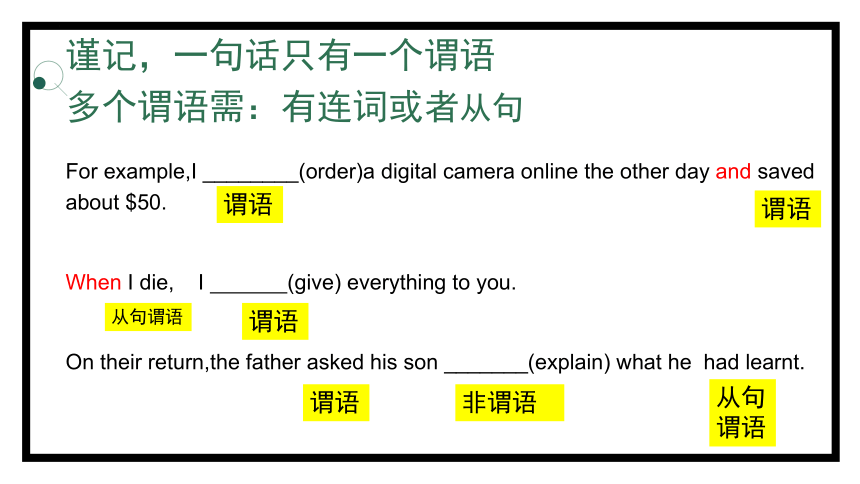
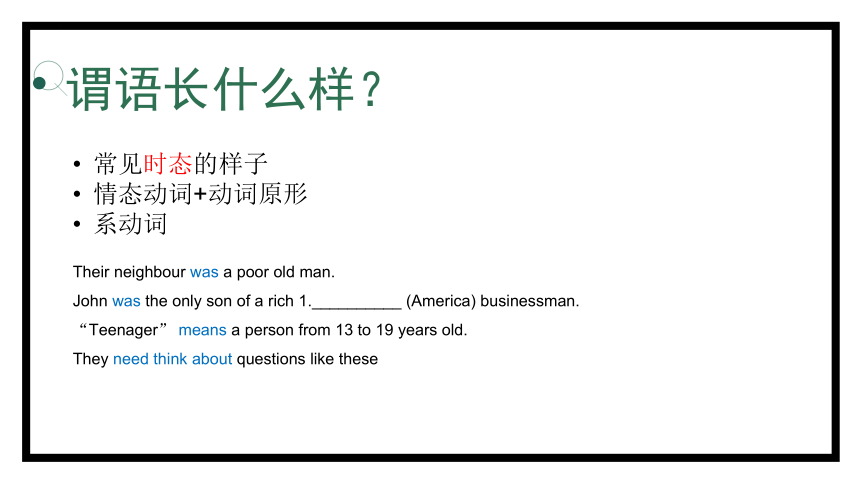
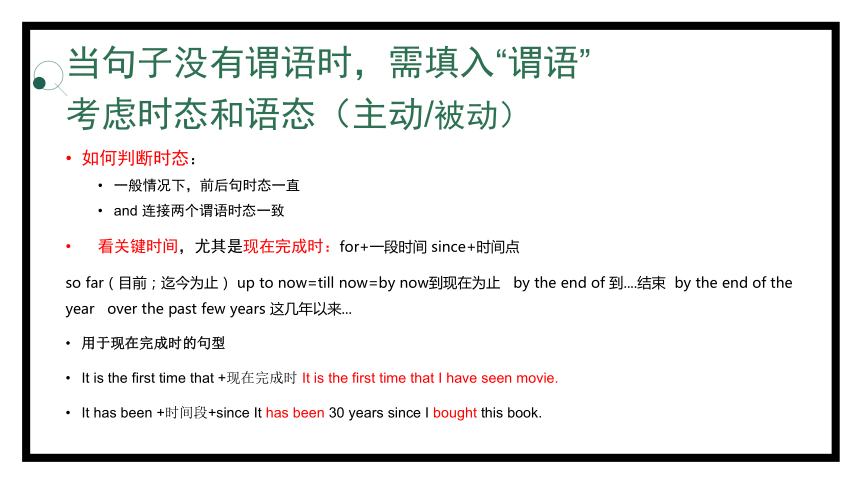
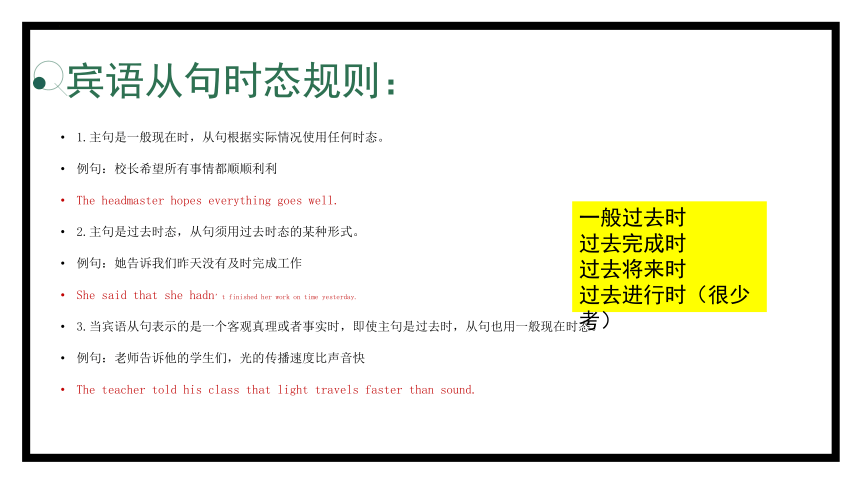
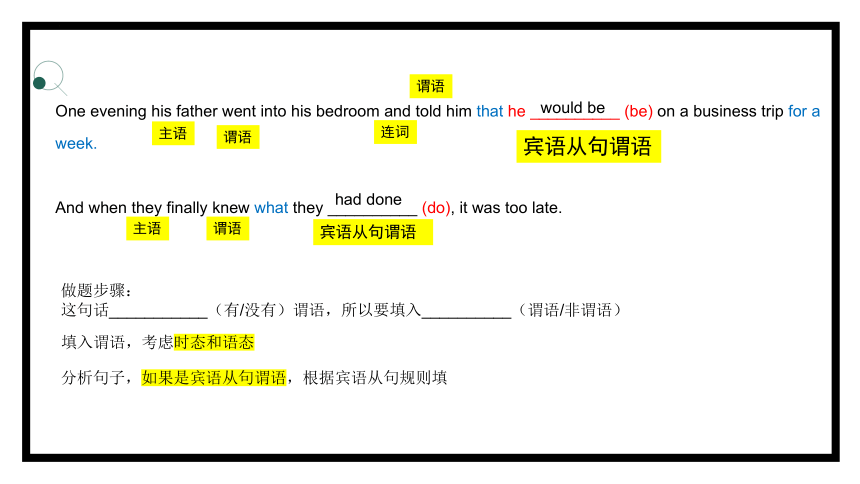
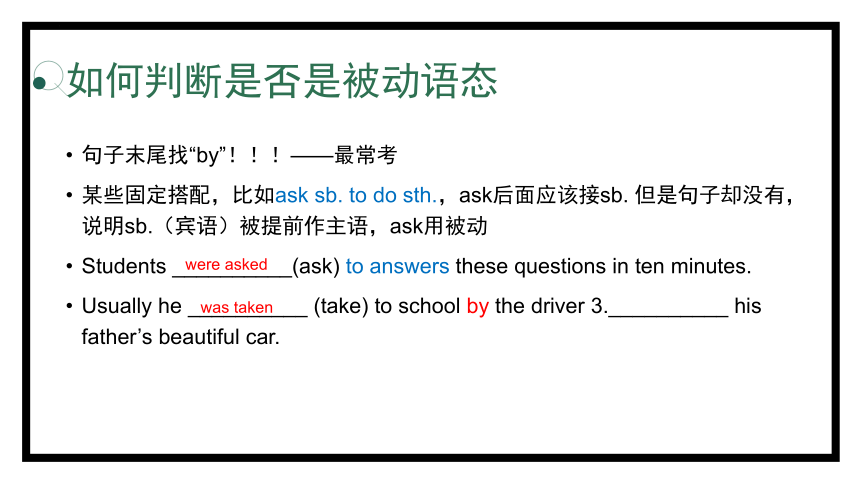
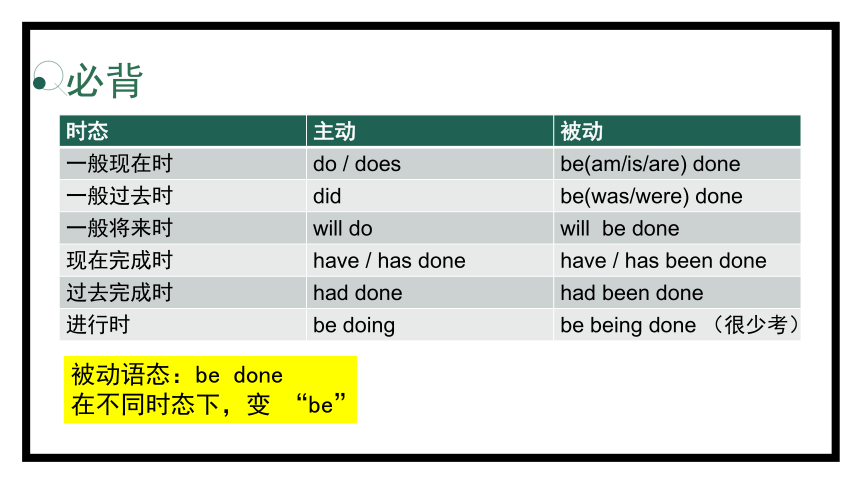
文档简介
(共23张PPT)
语法填空
谓语&非谓语
OUTLINE
谨记,一句话只有一个谓语
多个谓语需:有连词或者从句
For example,I ________(order)a digital camera online the other day and saved about $50.
When I die, I (give) everything to you.
On their return,the father asked his son _______(explain) what he had learnt.
谓语
谓语
谓语
谓语
非谓语
从句谓语
从句谓语
谓语长什么样?
常见时态的样子
情态动词+动词原形
系动词
Their neighbour was a poor old man.
John was the only son of a rich 1.__________ (America) businessman.
“Teenager” means a person from 13 to 19 years old.
They need think about questions like these
当句子没有谓语时,需填入“谓语”
考虑时态和语态(主动/被动)
如何判断时态:
一般情况下,前后句时态一直
and 连接两个谓语时态一致
看关键时间,尤其是现在完成时:for+一段时间 since+时间点
so far(目前;迄今为止) up to now=till now=by now到现在为止 by the end of 到....结束 by the end of the year over the past few years 这几年以来...
用于现在完成时的句型
It is the first time that +现在完成时 It is the first time that I have seen movie.
It has been +时间段+since It has been 30 years since I bought this book.
宾语从句时态规则:
1.主句是一般现在时,从句根据实际情况使用任何时态。
例句:校长希望所有事情都顺顺利利
The headmaster hopes everything goes well.
2.主句是过去时态,从句须用过去时态的某种形式。
例句:她告诉我们昨天没有及时完成工作
She said that she hadn’t finished her work on time yesterday.
3.当宾语从句表示的是一个客观真理或者事实时,即使主句是过去时,从句也用一般现在时态。
例句:老师告诉他的学生们,光的传播速度比声音快
The teacher told his class that light travels faster than sound.
一般过去时
过去完成时
过去将来时
过去进行时(很少考)
One evening his father went into his bedroom and told him that he __________ (be) on a business trip for a
week.
And when they finally knew what they __________ (do), it was too late.
做题步骤:
这句话___________(有/没有)谓语,所以要填入__________(谓语/非谓语)
填入谓语,考虑时态和语态
分析句子,如果是宾语从句谓语,根据宾语从句规则填
宾语从句谓语
主语
谓语
连词
谓语
主语
谓语
宾语从句谓语
would be
had done
如何判断是否是被动语态
句子末尾找“by”!!!——最常考
某些固定搭配,比如ask sb. to do sth.,ask后面应该接sb. 但是句子却没有,说明sb.(宾语)被提前作主语,ask用被动
Students __________(ask) to answers these questions in ten minutes.
Usually he __________ (take) to school by the driver 3.__________ his father’s beautiful car.
were asked
was taken
必背
时态 主动 被动
一般现在时 do / does be(am/is/are) done
一般过去时 did be(was/were) done
一般将来时 will do will be done
现在完成时 have / has done have / has been done
过去完成时 had done had been done
进行时 be doing be being done (很少考)
被动语态:be done
在不同时态下,变 “be”
In nature, everything __________ (use) again.
Our rubbish kills animals and ___________(pollute) water and soil.
Have you __________ (see) the smoke from cars and trucks on roads or the smoke from planes
At the age of 14, he first __________ (hear) of America.
One of my friends was __________(cheat) once.
Losses(亏损) 8.__________ (record) in red ink and profits(收益) in black ink.
is used
pollutes
seen
heard
cheated
were recorded
当句子有谓语时,只能填入非谓语/词汇变形
非谓语:doing
介词后面接动词,动词要加ing:介词+doing
某些动词后面再接动词,动词要加ing:某些动词+doing
常考的某些动词(like、enjoy、finish、complete、consider、suggest、advise、imagine、practise、miss、prevent、include、mind、risk冒险、keep、can't stand不能忍受、feel like、can't help情不自禁、be worth值得 、look forward to)
He practises _______(speak) English everyday.(speaking)
表示伴随或者修饰作用的时候。逻辑主语和动词是主动关系,使用doing
_____(Wait) there a long time,he felt impatient.(Waiting)
动词做主语,一般用doing
Helping others is happy.
非谓语动词:done
表示伴随或者修饰作用的时候。逻辑主语和动词是被动关系,使用done
I have a book________(write) by Tom.
_________(break) by Tom,the cup can’t be used.
________(use) as a means of traffic in China,the bike is very useful.
written
Broken
Used
如何找到非谓语动词的逻辑主语
通过翻译,判断“动词”由谁发出——主动关系,doing;被动关系,done
_______(wait) for a moment, he felt impatient.
等了一会,他很不耐烦——“wait”由 “he”发出,主动关系
________(hear) the bell, the students began to enter the classroom.
听到铃声,学生开始进入教室——”hear”由学生发出,主动关系
Waiting
Hearing
______(write) in a hurry, this article was not so good!
因为写得匆忙,这篇文章不是很好——“write”由 article 发出,被动关系
________(seen) from the top of the mountain, the city looks small.
从山顶上看,城市看上去很小 ——city和see的关系,只能是被看见
The teacher entered the classroom, ________(follow) by a group of students.
老师走进教室,后面跟着一群学生——老师是被跟着
Written
Seen
followed
对比
______(use) the book, I find it useful.
_______(use)for a long time, the book looks old.
在使用的过程中,我发现这本书很有用
use由“I”发出,主动关系——using
由于用了很长时间,这本书看上去很旧
use由“book”发出,被动关系——used,书是被使用的
Using
Used
对比
Seeing the new bike, he jumped with joy.
看见了新自行车,他高兴地跳了起来——(he做了see这个动作)
Seen from here, the picture appears beautiful indeed.
在这里看,这张画确实很美丽——(画是被看的)
Later, I worked in a small restaurant , serving the 6.__________ ( guest ), cleaning up the tables, washing the dishes and 7.__________ ( sweep ) the floors.
Once upon a time, there were some goblins(小精灵)__________ (live) in a forest.
谓语
非谓语
非谓语
与主语“I”形成主动关系
填doing
sweeping
谓语
非谓语
与“goblins”形成主动关系
填doing
living
__________ (eat)Turkey is their must.
谓语
主语
doing作主语
Eating
He rushed back and found the man ____( lie ) on the ground.
谓语
谓语
非谓语
与man形成主动关系
doing
lying
A Shenzhen student 1.__________ ( name) Wu Mingyu is the best teenage reader in China in the top reading competition held by CCTV.
Now I could ride with my eyes 9.__________ (close).
主语
谓语
非谓语
与student形成被动关系
“被叫做”填done
named
谓语
非谓语
与eyes形成被动关系
“眼睛被闭上”填done
closed
Then I took the car to have it ________ (repair)
谓语
非谓语
与it形成被动关系
“车被修理”填done
repaired
非谓语动词:To do
翻译成中文的时候,可以翻译为了做某事或者去做某事就可以用 to do,表目的、表方向
He came here_______(help)you。(to help)
特殊疑问词后面接动词,动词要用to do
I don’t know where_____(go). (to go)
当句子有谓语时,只能填入非谓语/词汇变形
词汇变形,谨记:修饰关系
Although it was a hard __________ _(decide), Li said she had no regrets.
Li Na is a __________ (succeed) sports star in China.
形容词
修饰名词/不定代词
名词
decision
名词
形容词修饰名词
形容词
successful
语法填空
谓语&非谓语
OUTLINE
谨记,一句话只有一个谓语
多个谓语需:有连词或者从句
For example,I ________(order)a digital camera online the other day and saved about $50.
When I die, I (give) everything to you.
On their return,the father asked his son _______(explain) what he had learnt.
谓语
谓语
谓语
谓语
非谓语
从句谓语
从句谓语
谓语长什么样?
常见时态的样子
情态动词+动词原形
系动词
Their neighbour was a poor old man.
John was the only son of a rich 1.__________ (America) businessman.
“Teenager” means a person from 13 to 19 years old.
They need think about questions like these
当句子没有谓语时,需填入“谓语”
考虑时态和语态(主动/被动)
如何判断时态:
一般情况下,前后句时态一直
and 连接两个谓语时态一致
看关键时间,尤其是现在完成时:for+一段时间 since+时间点
so far(目前;迄今为止) up to now=till now=by now到现在为止 by the end of 到....结束 by the end of the year over the past few years 这几年以来...
用于现在完成时的句型
It is the first time that +现在完成时 It is the first time that I have seen movie.
It has been +时间段+since It has been 30 years since I bought this book.
宾语从句时态规则:
1.主句是一般现在时,从句根据实际情况使用任何时态。
例句:校长希望所有事情都顺顺利利
The headmaster hopes everything goes well.
2.主句是过去时态,从句须用过去时态的某种形式。
例句:她告诉我们昨天没有及时完成工作
She said that she hadn’t finished her work on time yesterday.
3.当宾语从句表示的是一个客观真理或者事实时,即使主句是过去时,从句也用一般现在时态。
例句:老师告诉他的学生们,光的传播速度比声音快
The teacher told his class that light travels faster than sound.
一般过去时
过去完成时
过去将来时
过去进行时(很少考)
One evening his father went into his bedroom and told him that he __________ (be) on a business trip for a
week.
And when they finally knew what they __________ (do), it was too late.
做题步骤:
这句话___________(有/没有)谓语,所以要填入__________(谓语/非谓语)
填入谓语,考虑时态和语态
分析句子,如果是宾语从句谓语,根据宾语从句规则填
宾语从句谓语
主语
谓语
连词
谓语
主语
谓语
宾语从句谓语
would be
had done
如何判断是否是被动语态
句子末尾找“by”!!!——最常考
某些固定搭配,比如ask sb. to do sth.,ask后面应该接sb. 但是句子却没有,说明sb.(宾语)被提前作主语,ask用被动
Students __________(ask) to answers these questions in ten minutes.
Usually he __________ (take) to school by the driver 3.__________ his father’s beautiful car.
were asked
was taken
必背
时态 主动 被动
一般现在时 do / does be(am/is/are) done
一般过去时 did be(was/were) done
一般将来时 will do will be done
现在完成时 have / has done have / has been done
过去完成时 had done had been done
进行时 be doing be being done (很少考)
被动语态:be done
在不同时态下,变 “be”
In nature, everything __________ (use) again.
Our rubbish kills animals and ___________(pollute) water and soil.
Have you __________ (see) the smoke from cars and trucks on roads or the smoke from planes
At the age of 14, he first __________ (hear) of America.
One of my friends was __________(cheat) once.
Losses(亏损) 8.__________ (record) in red ink and profits(收益) in black ink.
is used
pollutes
seen
heard
cheated
were recorded
当句子有谓语时,只能填入非谓语/词汇变形
非谓语:doing
介词后面接动词,动词要加ing:介词+doing
某些动词后面再接动词,动词要加ing:某些动词+doing
常考的某些动词(like、enjoy、finish、complete、consider、suggest、advise、imagine、practise、miss、prevent、include、mind、risk冒险、keep、can't stand不能忍受、feel like、can't help情不自禁、be worth值得 、look forward to)
He practises _______(speak) English everyday.(speaking)
表示伴随或者修饰作用的时候。逻辑主语和动词是主动关系,使用doing
_____(Wait) there a long time,he felt impatient.(Waiting)
动词做主语,一般用doing
Helping others is happy.
非谓语动词:done
表示伴随或者修饰作用的时候。逻辑主语和动词是被动关系,使用done
I have a book________(write) by Tom.
_________(break) by Tom,the cup can’t be used.
________(use) as a means of traffic in China,the bike is very useful.
written
Broken
Used
如何找到非谓语动词的逻辑主语
通过翻译,判断“动词”由谁发出——主动关系,doing;被动关系,done
_______(wait) for a moment, he felt impatient.
等了一会,他很不耐烦——“wait”由 “he”发出,主动关系
________(hear) the bell, the students began to enter the classroom.
听到铃声,学生开始进入教室——”hear”由学生发出,主动关系
Waiting
Hearing
______(write) in a hurry, this article was not so good!
因为写得匆忙,这篇文章不是很好——“write”由 article 发出,被动关系
________(seen) from the top of the mountain, the city looks small.
从山顶上看,城市看上去很小 ——city和see的关系,只能是被看见
The teacher entered the classroom, ________(follow) by a group of students.
老师走进教室,后面跟着一群学生——老师是被跟着
Written
Seen
followed
对比
______(use) the book, I find it useful.
_______(use)for a long time, the book looks old.
在使用的过程中,我发现这本书很有用
use由“I”发出,主动关系——using
由于用了很长时间,这本书看上去很旧
use由“book”发出,被动关系——used,书是被使用的
Using
Used
对比
Seeing the new bike, he jumped with joy.
看见了新自行车,他高兴地跳了起来——(he做了see这个动作)
Seen from here, the picture appears beautiful indeed.
在这里看,这张画确实很美丽——(画是被看的)
Later, I worked in a small restaurant , serving the 6.__________ ( guest ), cleaning up the tables, washing the dishes and 7.__________ ( sweep ) the floors.
Once upon a time, there were some goblins(小精灵)__________ (live) in a forest.
谓语
非谓语
非谓语
与主语“I”形成主动关系
填doing
sweeping
谓语
非谓语
与“goblins”形成主动关系
填doing
living
__________ (eat)Turkey is their must.
谓语
主语
doing作主语
Eating
He rushed back and found the man ____( lie ) on the ground.
谓语
谓语
非谓语
与man形成主动关系
doing
lying
A Shenzhen student 1.__________ ( name) Wu Mingyu is the best teenage reader in China in the top reading competition held by CCTV.
Now I could ride with my eyes 9.__________ (close).
主语
谓语
非谓语
与student形成被动关系
“被叫做”填done
named
谓语
非谓语
与eyes形成被动关系
“眼睛被闭上”填done
closed
Then I took the car to have it ________ (repair)
谓语
非谓语
与it形成被动关系
“车被修理”填done
repaired
非谓语动词:To do
翻译成中文的时候,可以翻译为了做某事或者去做某事就可以用 to do,表目的、表方向
He came here_______(help)you。(to help)
特殊疑问词后面接动词,动词要用to do
I don’t know where_____(go). (to go)
当句子有谓语时,只能填入非谓语/词汇变形
词汇变形,谨记:修饰关系
Although it was a hard __________ _(decide), Li said she had no regrets.
Li Na is a __________ (succeed) sports star in China.
形容词
修饰名词/不定代词
名词
decision
名词
形容词修饰名词
形容词
successful
同课章节目录
- 词法
- 名词
- 动词和动词短语
- 动词语态
- 动词时态
- 助动词和情态动词
- 非谓语动词
- 冠词
- 代词
- 数词和量词
- 形容词副词及其比较等级
- 介词和介词短语
- 连词和感叹词
- 构词法
- 相似、相近词比较
- 句法
- 陈述句
- 一般疑问句和否定疑问句
- 特殊疑问句及选择疑问句
- 反意疑问句
- 存在句(There be句型)
- 宾语从句
- 定语从句
- 状语从句
- 主谓一致问题
- 简单句
- 并列句
- 复合句
- 主谓一致
- 主、表语从句
- 名词性从句
- 直接引语和间接引语
- 虚拟语气
- 感叹句
- 强调句
- 倒装句
- 祈使句
- 句子的成分
- 句子的分类
- 题型专区
- 单项选择部分
- 易错题
- 完形填空
- 阅读理解
- 词汇练习
- 听说训练
- 句型转换
- 补全对话
- 短文改错
- 翻译
- 书面表达
- 任务型阅读
- 语法填空
- 其他资料
